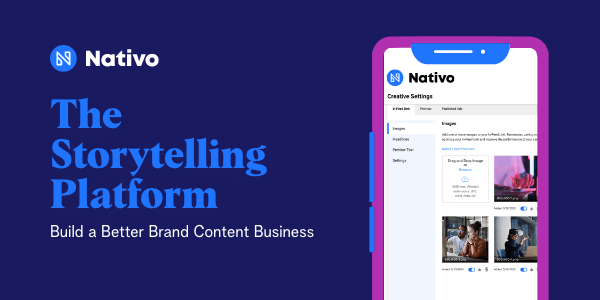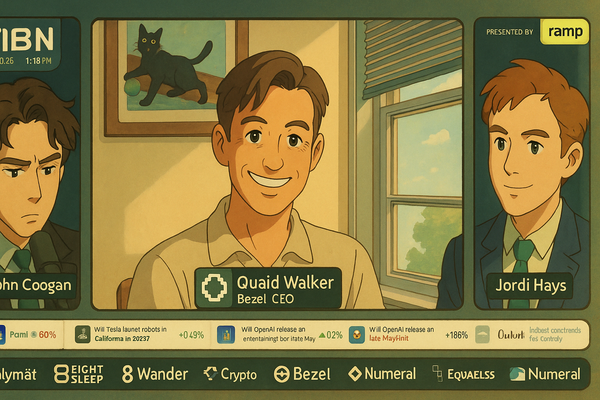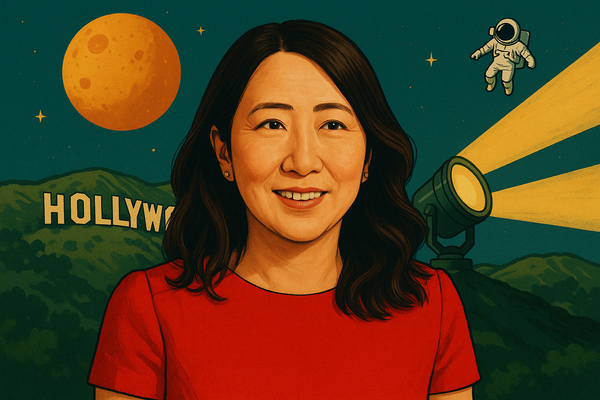The talent premium
Top talent will take the independent path

We are planning an expansion of the number of in-person events The Rebooting does in the fall and in 2024. Check out some highlights from “The New Attention Economy,” the three-day event we held in Cannes in partnership with Kerv Interactive.Coming in the fall, we’re doing more executive dinners and small-scale gatherings that are lanyard-free zones. Let us know if you want invites.
This week, I wrote about the repricing of talent and some more on what ails the open web. First up, a message from Nativo.

The OG of consideration ad products

Did you know that branded content drives revenue for 88% of publishers? It’s the second most popular source of income for publishers, so not leveraging content means you’re leaving a lot of money on the table.
Brands know you can’t get a consumer from awareness to purchase without having marketing strategies that address the customer journey in-between. That is where content, as an ad format, shines.
Branded content is unmatched as that consideration ad product. Content allows brands to tell their story, influence, entertain & inform - ultimately guiding consumers towards a path to purchase on their own terms.
The Nativo Platform has helped hundreds of publishers strengthen their ad portfolios with formats that solve for the mid-funnel.
The talent premium
On this week’s episode of People vs Algorithms, we discussed the repricing of talent, more evidence that news is a terrible business, and why LinkedIn is the best social network. Listen on Apple, Spotify or elsewhere. Send me a note with your thoughts and feedback.
We have left behind some of the craziness of the zero interest rate era and entered into a period of repricing that will benefit some and serve as a wake-up call for others.
ESPN has begun culling some of its roster of big name commentators, preparing for a drastically different economic picture as the subsidies of the cable bundle dwindle and eventually go away. The land grab phase of the streaming wars fooled many into thinking there was bountiful money to go around. In fact, it was just cheap debt fueling players buying market share. With the talent joining writers on the picket line, Hollywood is heading for its first industry-wide shutdown since 1960.
We have seen this repricing happen across media at institutional brands. Look at the “talent” that sits atop magazine brands. Those jobs are not as lucrative as they once were. One theory about Edward Enninful leaving one of the plum perches in magazine publishing, the editor of British Vogue, is that he can make far more money as a stylist. The mandate for those leading these organizations is to get leaner. Those with the biggest salaries are big targets, particularly as cultural talent becomes an entrepreneurial profession vs a Condé sinecure. Vanity Fair’s editor makes a quarter what Graydon Carter did in the same post.
Managing decline means star power is less important than wringing the intangible asset value from these brands.
Many of these companies will need to embrace a future where the media they create is a front for another business that’s more “performant,” to use the clinical language favored by the operator class. Most magazine businesses are likely to make far more from a combination of commerce, agency services, licensing and events than they are from ads and subs. This is a more grubby than glitzy affair.
There are still top stars in Hollywood who carry blockbusters, but they are a small group. The model favored is franchises where the IP does the heavy lifting. Barbie could prove the apotheosis of this, more of a marketing campaign supported by a movie than the reverse.
In fashion, Pharrell didn’t get the plum creative director job at Louis Vuitton because of his design prowess honed at Central Saint Martin; he’s a media company of his own right and is more of a collaboration partner more suited for the “society of spectacle.”
The risk is a doom loop in which the biggest companies can’t compete for top talent that will, by default, take an independent path and choose autonomy over being whacked because of a spreadsheet – and sometimes you get smeared on the way out to boot.
Better for talent to negotiate business deals than employment deals. That’s what Messi did with Amazon and Major League Soccer, and it’s what Pat McAfee did with ESPN. It’s fitting that Hall of Fame quarterback Steve Young got whacked by ESPN while the “drunk punter” got an $85 million deal. Long way from late-night swims in the Broad Ripple canal. McAfee moves the needle and most on-air personalities do not. They are household names because of ESPN, not vice versa. It’s about the sports rights, stupid.

Raise your commerce content earnings
If you’re looking to increase your earnings in a fiercely competitive industry, check out this infographic to discover how publishers are:
- Structuring their programs and overcoming common challenges
- Investing in growth tools and partnerships
- Implementing solutions that supercharge revenue
Learn how the world’s largest publishers are helping their programs thrive.
Ad-driven media
The drivers of the digital economy will be different, particularly as the open web undergoes a major shift in distribution and monetization.
The distribution shift is upon us with the wholesale remaking of the search experience. That will leave plenty of carnage. Paired with that is a long decline in the efficacy of the workhorse of open web monetization in the form of display advertising, particularly open web programmatic display. Those two pillars together by default mean the open web as it has operated will enter a new phase.
Any transition leads to people harrumphing “hogwash.” Look at what’s happening in the “debate” over the energy transition. Al Gore was right about the internal combustion engine in 1992; people just didn’t want to hear it.
It’s easy to blame programmatic advertising for the failures of the open web. After all, as John points out, the inversion of publishing in service of advertising has led to perverse incentives and even more perverse outcomes. Made-for-advertising sites are a scourge, with the Association of National Advertisers estimating that over 20% of open programmatic ad budgets are wasted on content created to game the system. The proliferation of MFA sites is a sign of an $88 billion ecosystem that is not well.
A hopeful outcome is that what comes next returns the act of publishing on serving interested audiences rather than looking to optimize to whatever drives the biggest programmatic advertising yield. HTL CEO John Shankman wrote in to offer his take:
“Why does the internet exist? Publishing. What supports publishing? Advertising. Unfortunately, it’s been somewhat swapped during the proliferation of the Lumascape over the past 20-30 years: It seems as though publishing was in support of advertising.”
I’ve long thought that of the many candidates for the designation of “original sin” of digital publishing one of the most compelling is the separation of the audience data from the media impression. It was, and is, a neat trick. This is the kind of thing that thrills both marketers and procurement officers: The end of “wastage.” Of course, the very act of doing so doomed publishers to serving a bit role in digital advertising as vessels for ad impressions. For all the talk of “premium content,” on a spreadsheet tracking performance, premium doesn’t get extra points for conversions.
Many years ago, I asked Susan Wojicki about premium content on Youtube. She shifted the discussion to “premium audiences.” This was telling since what she knew is that the idea that one piece of content being so special vs another is a matter of subjective taste. Ultimately, performance is all that matters, and performance is driven by premium data.
And the open programmatic landscape was architected with a flaw: identity was not baked into the system, instead relying largely on a workaround in the form of the third-party cookie, which is being retired after nearly 30 years of service. Without a common identifier, even one as imperfect as the cookie, publishers stand little to no show in competing with data-rich platforms and emerging channels like retail media. Publishers are bringing a butter knife to a gun fight.
Thanks to Nativo and Impact for sponsoring this edition of The Rebooting. We’ve worked with 17 different partners this year who believe in creating a more sustainable, equitable and resilient media ecosystem. Find out more about sponsorships here.




